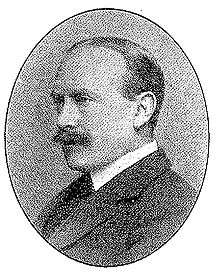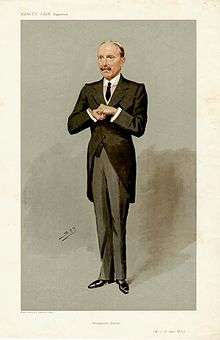John Rees (civil servant)
Sir John David Rees, 1st Baronet, KCIE, CVO (16 December 1854 – 2 June 1922[1]) was a colonial administrator in British India and subsequently a Member of Parliament at Westminster.


Biography
He was educated at Cheltenham College and joined the Indian Civil Service in 1875. He served mostly in the south of India where he was Under-Secretary in the Madras Government, and later the British Resident in Travancore and Cochin. He also served as an Additional Member of the Governor-General's Council in the 1890s.
In 1901, Rees retired from the Civil Service. He was an active proponent of the Raj and wrote a number of books on British India. The Real India, first published in 1908, went through a number of editions. In 1902, he had even contributed a number of columns to the Times Literary Supplement on Indian matters.
Parliament
He served two terms as Member of Parliament (MP): from 1906 to 1910 as the Liberal MP for Montgomery constituency, and from 1912 to 1922 as the Unionist MP for Nottingham East.
He also unsuccessfully contested Kilmarnock Burghs at a by-election in 1911.[2]
Family
He married Mary Catherine Dormer in 1891,[3] and was created a baronet on 8 May 1919. Lady Rees was a correspondent of George Orwell.[4]
Their daughter Rosemary Rees, later Lady du Cros (1901-1994) was an aviator and one of the first eight female pilots appointed to the Air Transport Auxiliary during the Second World War. She was also a qualified flight instructor and was one of the few pilots to receive an MBE for her work in this field.[5]
He was succeeded in the baronetcy by his son, Richard Rees, the inspiration for Ravelston in Orwell's Keep The Aspidistra Flying.
Selected works
- Tours in India
- The Mahommedans
- The Real India
- Modern India
- Current Political Problems
References
- Leigh Rayment's Historical List of MPs – Constituencies beginning with "N" (part 3)
- Debrett's House of Commons and the Judicial Bench, 1916
- "Rees, John David". Who's Who. Vol. 59. 1907. pp. 1465–1466.
- "Letter from Orwell to Mary Catherine Rees". UCL Library Services.
- "Rosemary Theresa (nee Rees), Lady du Cros (1901-1994)". National Portrait Gallery, London.
External links
- Hansard 1803–2005: contributions in Parliament by John Rees
| Parliament of the United Kingdom | ||
|---|---|---|
| Preceded by Edward Pryce-Jones |
Member of Parliament for Montgomery 1906 – December 1910 |
Succeeded by Edward Pryce-Jones |
| Preceded by James Morrison |
Member of Parliament for Nottingham East 1912–1922 |
Succeeded by John Houfton |
| Baronetage of the United Kingdom | ||
| New creation | Baronet (of Aylward's Chase) 1919–1922 |
Succeeded by Richard Rees |